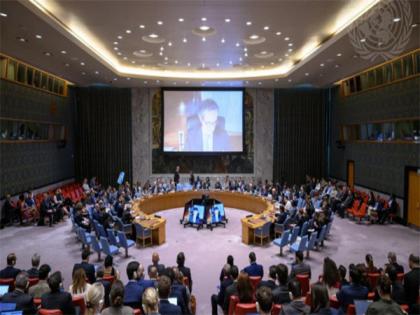IAEA confirms internal contamination after Israel airstrikes partially destroy Natanz nuclear facility
By ANI | Updated: June 14, 2025 09:23 IST2025-06-14T09:18:29+5:302025-06-14T09:23:30+5:30
Vienna [Austria], June 14 : The International Atomic Energy Agency (IAEA) Director General Rafael Grossi, in his statement to ...

IAEA confirms internal contamination after Israel airstrikes partially destroy Natanz nuclear facility
Vienna [Austria], June 14 : The International Atomic Energy Agency (IAEA) Director General Rafael Grossi, in his statement to the United Nations Security Council (UNSC) on Friday, confirmed that Israel's airstrikes on Iran's Natanz nuclear site caused internal radiological and chemical contamination.
However, radiation levels outside the site remain normal, posing no threat to the public or the environment.
"However, due to the impacts, there is radiological and chemical contamination inside the facilities in Natanz. The type of radiation present inside the facility, primarily alpha particles, is manageable with appropriate radiation protection measures," Grossi said in his statement.
The IAEA chief said the Israeli attacks destroyed the above-ground section of the Pilot Fuel Enrichment Plant, where uranium was being enriched up to 60 per cent U-235.
Grossi stated that the agency has been in "permanent contact" with Iran's Nuclear Regulatory Authority to assess the damage and ensure nuclear safety and security.
"Iran has confirmed that at present, only the Natanz Fuel Enrichment Plant site has been attacked in today's strikes. This facility contains the Fuel Enrichment Plant and the Pilot Fuel Enrichment Plant," The IAEA Director General said.
He added that the electrical infrastructure, including the main and emergency power systems, was also destroyed. While there is no visible damage to the underground cascade hall, the loss of power may have affected the centrifuges housed there.
"There is no indication of a physical attack on the underground cascade hall containing part of the Pilot Fuel Enrichment Plant and the main Fuel Enrichment Plant. However, the loss of power to the cascade hall may have damaged the centrifuges there," the IAEA Chief added.
According to Grossi, Iran has also informed the agency of attacks near other sites, including the Fordow Fuel Enrichment Plant and the Esfahan complex. These facilities include a uranium conversion facility, a fuel plate fabrication plant, a fuel manufacturing plant, and a Uranium dioxide (UO2) powder plant. The IAEA said it has not yet verified the full extent of any damage to these locations.
"All these developments are deeply concerning. I have repeatedly stated that nuclear facilities must never be attacked, regardless of the context or circumstances, as it could harm both people and the environment. Such attacks have serious implications for nuclear safety, security and safeguards, as well as regional and international peace and security," Grossi said.
The IAEA's Incident and Emergency Centre (IEC) has been in continuous contact with Iranian officials since the attack. A task force of senior agency staff has also been set up to monitor the situation 24/7 and report to the UN Security Council if required.
"As Director General of the International Atomic Energy Agency, and consistent with the objectives of the IAEA under the IAEA Statute, I call on all parties to exercise maximum restraint to avoid further escalation," Grossi said.
He added that the agency is prepared to deploy nuclear safety and security experts, in addition to its existing safeguards inspectors in Iran.
Grossi also informed the IAEA Board of Governors that he is ready to travel to the region to assess the situation directly. "I have indicated to the respective authorities my readiness to travel at the earliest to assess the situation and ensure safety, security and non-proliferation in Iran. I have also been in contact with our inspectors in Iran and Israel. The safety of our staff is of paramount importance. All necessary actions are being taken to ensure they are not harmed," he said.
On Friday, Israel launched "pre-emptive" strikes on Iran's nuclear facilities. In a clarification, the Israeli Defence Forces (IDF) said in a post on X, "Iran is closer than ever to obtaining a nuclear weapon. Weapons of mass destruction in the hands of the Iranian regime are an existential threat to the State of Israel and to the wider world. The State of Israel has no choice but to fulfil the obligation to act in defence of its citizens and will continue to do so everywhere it is required to do so."
Following the attack, CNN reported that several of Iran's top figures, including military leaders and nuclear scientists, were killed. In response, Iran retaliated by launching loitering munitions and missile strikes on Tel Aviv. Israel has since continued its counterstrikes.
Disclaimer: This post has been auto-published from an agency feed without any modifications to the text and has not been reviewed by an editor
Open in app